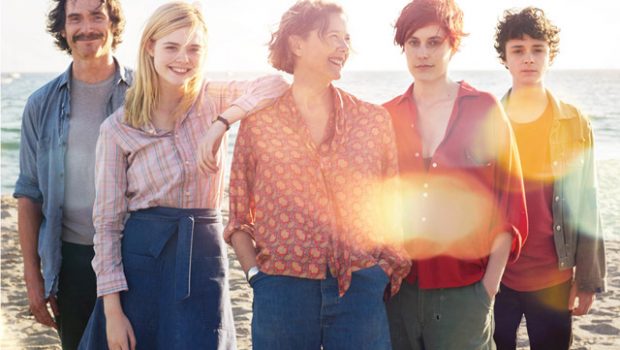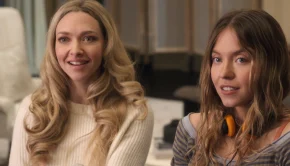20th Century Women – Film Review
Reviewed by Damien Straker on the 23rd of May 2017
eOne presents a film by Mike Mills
Produced by Anne Carey, Megan Ellison and Youree Henley
Written by Mike Mills
Starring Annette Bening, Elle Fanning, Greta Gerwig, Lucas Jade Zumann and Billy Crudup
Music by Roger Neill
Cinematography Sean Porter
Edited by Leslie Jones
Rating: M
Running Time: 118 minutes
Release Date: the 1st of June 2017
Mike Mills’ new film 20th Century Women resonates because it is intimidating and deep. These are not words often descriptive of contemporary American cinema anymore as the medium has succumbed to being infantilised by nostalgia, reboots and sequels each week.
The refreshing quality of Women begs to ask why it’s taken so long for a film of this quality, nominated for an Oscar no less, to be released here in Australia. The number of untapped film demographics, disinterested in reliving their teenage superhero dreams, means there’s no better time for distributors to latch onto a high-quality, female-led film that anyone with half a brain will find relatable.
The early parts of the film are admittedly challenging. It doesn’t provide a cut and dry introduction to each character immediately, meaning you must determine their relationships to each other for yourself. Additionally, the general volume of information and the unique images, including still photographs and a galactic shot, can make for an overwhelming start.
However, the longer the film continues, the more revealing the characters’ backstory, which adds to the context, clarity and relatability. Our patience is rewarded by meeting a collection of unique characters that have interesting traits and don’t play out their lives like movie characters, which is a rarity.
The film is set in 1979 in Santa Barbra, California. Dorothea (Annette Bening) is an ageing single mother facing a major juggling act. Her son Jamie (Lucas Jade Zumann) is a teenager who is starting to break away from her. She tries unsuccessfully to create a father figure out of her local handyman William (Billy Crudup), an ex-hippy who excels at practical work but is still finding meaning in his life.
After Jamie has a health scare, Dorothea tries enlisting help from two different women. She asks Abbie (Greta Gerwig) and Julie (Elle Fanning) to be parental-like figures for Jamie. Julie, forced by her own mother to attend group therapy sessions, is a teenager who tells Jamie that she doesn’t want to spoil their friendship with sex. Abbie, a boarder in Dorothea’s house, has also had a fallout with her own mother and retreated from a recent cancer scare. She introduces Jamie to the emerging punk music scene and hardcore feminism.
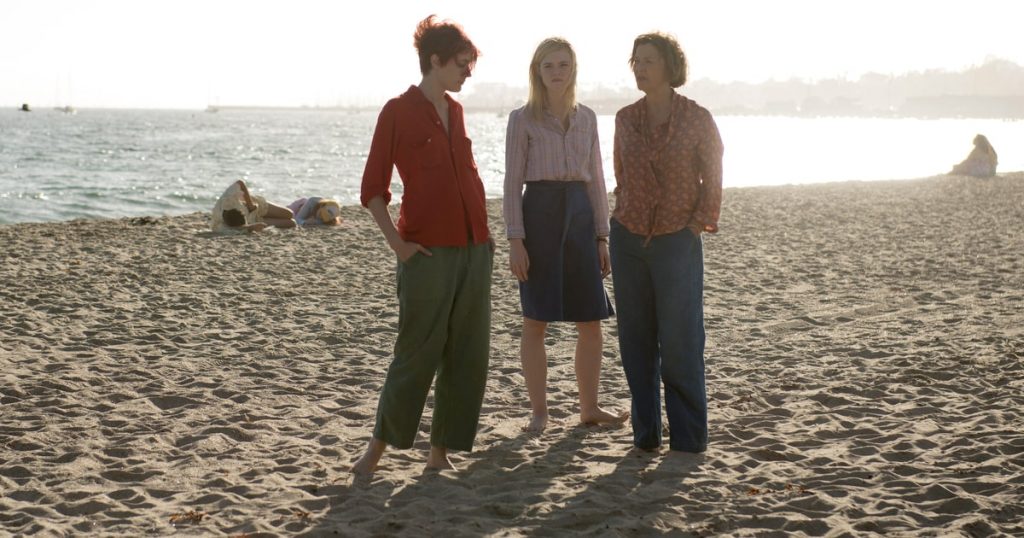
Mike Mill’s flurry of ideas, themes and questions, raised through his characters, overwhelms on a single viewing—a positive trait highlighting the film’s intellectual longevity. The film’s essence is conflict of generations and gender. It is about ordinary people out of their depth when transcending age or assigned gender roles.
The film’s unique perspective, distancing itself from easy, youthful coming of age exuberance in works such as Almost Famous (2000), is placing an older woman at the narrative’s forefront. Dorothea, who belonged to the Depressed generation where people thrived on solidarity, elicits our sympathy because of the mountain ahead of her. Her son is gravitating towards a late ‘70s cultural shift of individuality, self-expression and transcendent pop cultural norms, all of which are understandably alien to her.
After she asks the two younger women to be parental figures, the alienation and conflict deepens because of the differing social parameters. One example of the age and gender binary is when Dorothea argues with Abbie about Jamie being too young to indulge in hardcore feminism, despite initially asking Abbie to nurture him.
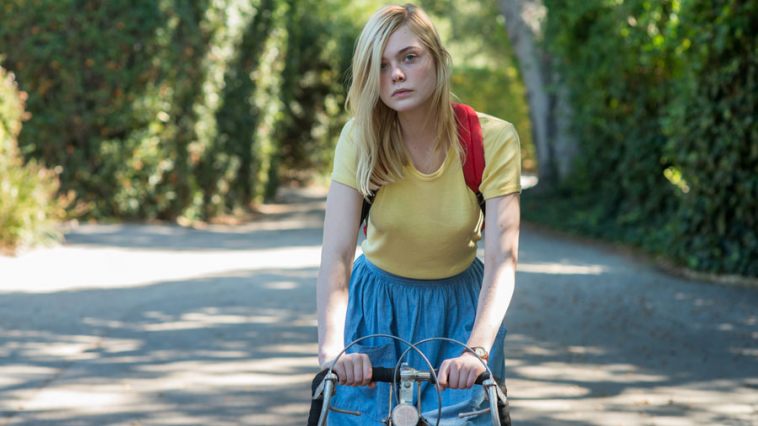
New questions sprout in Women: what makes a good man? Is it ever too late or too early for that to occur? Do you have to be a certain age to become wise about people and life? Even William fails as a parental figure; he is battling his own belated adolescence, conceding he attracts women but doesn’t know what to do afterwards.
Dysfunctional families and conflict between parents and children are common to Mills’ oeuvre, which includes Thumbsucker (2o05) and Beginners (2010). This is his first film in seven years and is stylistically unlike any American movie in recent times—a factor which takes some adjustment.
Women’s peculiar filmic style successfully combines naturalism and audio-visual poetry. The natural light used to capture the sunshine and heat of Santa Barbra and its skate culture is contrasted with deft, psychedelic colour filtering on the images, which are deliberately sped up, such as Julie bolting up a ladder to Jamie’s window. Likewise, a long shot of Jamie skateboarding highlights an emotional distance.
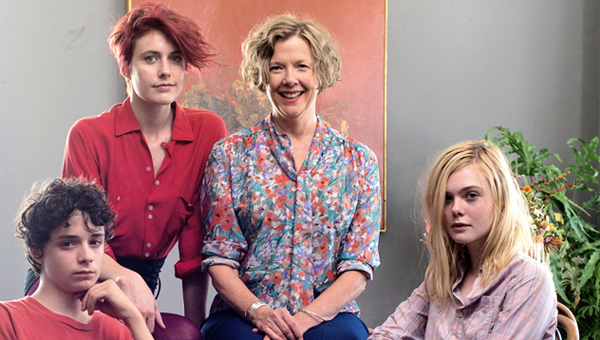
We are effectively embedded into the velocity and speed of youthful change, contextual to 1979, which is then juxtaposed with still photographs and footage from the older generations, thereby showing the gap between the ages. Mills’ visual choices are therefore admittedly surprising and bold, but purposeful and oddly beautiful.
The quick snapshots of the images are symmetrical with the narrative structure. Women unfolds as a series of vignettes or character moments, carefully avoiding movie scenes we could usually time to our watches. The fragmented, moment-to-moment shape of this film is intentional and what lingers strongest. Much of the film is, like art, drawn from personal experiences and memories.
This film is based on Mills and his own mother, with her being from the 1920s generation and him being born in the 1960s. He talked to the actors about his mother on the set and showed them photographs of her. Similarly, the cancer storyline was researched by talking to a loved one.
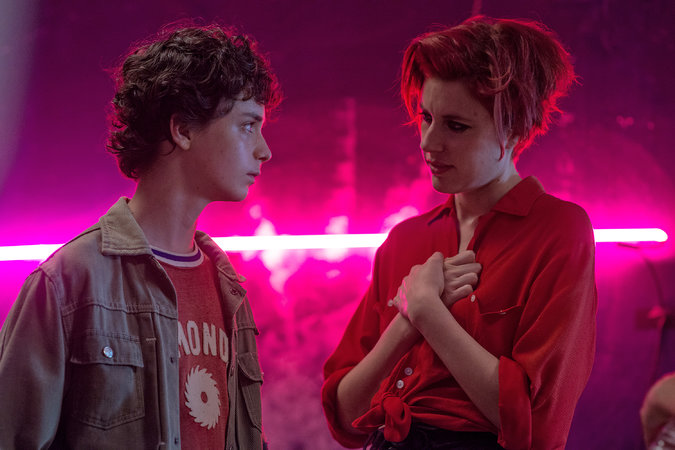
Mills’ preparation is comparable to Robert Altman’s pre-shooting style. He places heavy emphasis on rehearsals, and apparently had the actors participate in games, make things appropriate to their characters and read books (including ‘The Road Less Travelled’ by M. Scott Peck) featured in the movie.
The immersion is why the performances, particularly of the three women, ignite. Annette Bening dissolves into the age and the dilemmas of her character with an effortlessness that underlines her own life experiences and make her perfect for this role. Elle Fanning and Greta Gerwig both embody their characters with a wounded expressiveness to dramatise them as sophisticated young people, but sometimes out of their depth.
Notably, these actors make even the simplest of scenes funny. One memorable moment is when Dorothea and William dance to the beats of some new age music in a failed, hilarious bid to understand this weird new generation. While I may not have understood every piece of the film, it’s the intimate scenes between the characters and individual lines of dialogue that are painfully honest and real. At one point Jamie asks Dorothea about loving his dad and she says he was just a solution, which typifies the sadness.
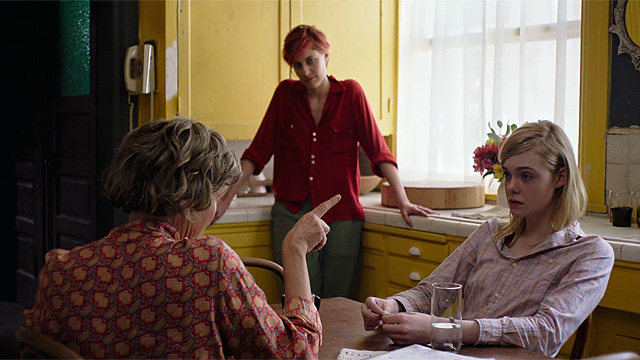
Women’s challenging nature and originality is intimidating and beneficial. You’re stimulated and pulled through this weird world where you feel disorientated but somehow it grows into something different and affecting—perhaps not unlike Dorothea and those funky punk beats. After all, she is a hero to many people in this film.
Summary: Mike Mills’ new film 20th Century Women resonates because it is intimidating and deep.


